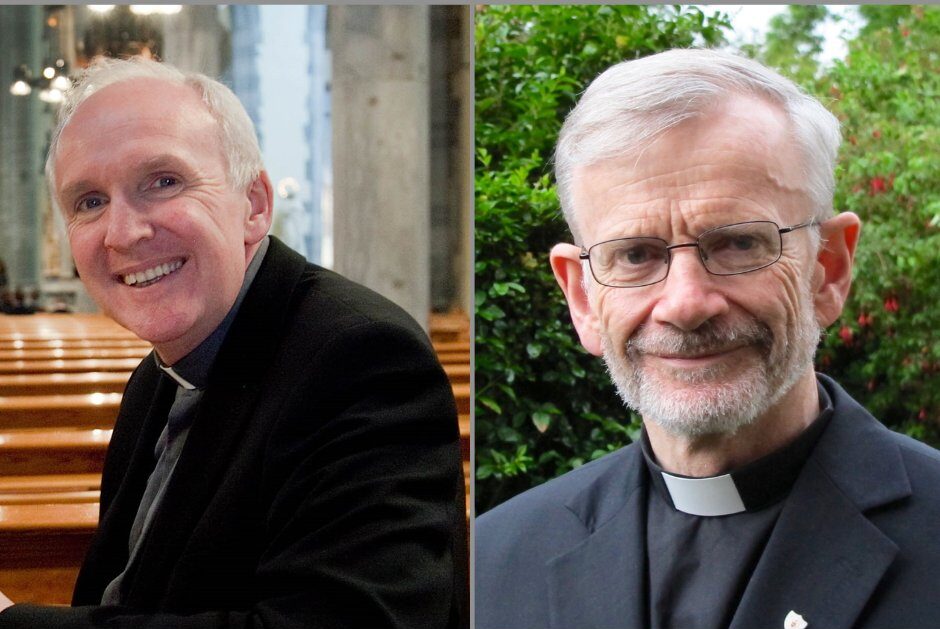Bishop Leahy and Bishop McGuckian were the nominees of the Irish Catholic Bishops’ Conference who attended the XVI Synodal Assembly from 4 – 29 October in Rome, on the theme: ‘For a Synodal Church: Communion, Participation, and Mission’. At the Winter 2023 Standing Committee (20 November 2023) of the Bishops’ Conference, they presented a report of their Synod experience, and outlined four main points:
The Experience – Bishop Leahy and Bishop McGuckian said, “the Synodal Assembly was a deeply intense experience, spiritually, culturally and theologically. Our first word in response is “thanks” – to God for this grace and to all who contributed so generously over the past two years to the Synodal pathway in parishes and religious congregations, dioceses, movements and organisations. We offer a special word of “thanks” to the many people who accompanied the XVI Synodal Assembly with prayer. There was much prayer during the XVI Synodal Assembly. We started with an ecumenical prayer service and then three days of a retreat with Father Timothy Radcliffe OP and Mother Maria Angelini OSB. Apart from the daily prayers during the Synod, we had special moments of prayer for refugees and migrants and for peace. We visited the catacombs in a pilgrimage of prayer. Throughout our deliberations in the Synod hall, there were regular periods of silence to take on board what was being said by others and to pray. The format for this Synodal Assembly was completely different to previous synods, with a “Conversations in the Spirit” methodology and round-table group work.”
Take-Aways – The bishops said, “The biggest outcome from the Synodal Assembly is probably the emphasis on the “Conversations in the Spirit”. The four weeks were an intense learning by doing with the constant repetition of the method. The desire emerged that this method, perhaps tweaked according to context, will spread now throughout the Church. The way the modules or sections of the Assembly worked was that we were seated in groups of 11 with a facilitator for each group. Each group had a specific topic that it discussed over a period of approximately three days and then the members moved on to another group and another topic. After a period of prayer to begin each session, each person was given four minutes to put forward their perspective on the topic, without interruptions from others. This was followed by a period of silence and prayer. In a second round, each of us got four minutes to say what had struck us listening to the others – what had resonated positively for us and what had prompted resistance in us.”
Actions emerging from the Final Synthesis – Bishop Leahy and Bishop McGuckian continued to say, “At times there was a sense among some participants that the Synod was biting off more than it could chew. The final Synthesis reflects the many, many topics touched upon. It is a little miracle how the teams of writers managed to pull it all together. Sister Patricia Murray, an Irish Loreto Sister, was nominated by the Pope as a member of the editing commission for the Final Synthesis. The Final Synthesis document provides a rich theological grounding for synodality and the topics named are well presented. There are many nuggets of wisdom, insight and perspective contained in the text. It would be well worth taking even just a section or chapter of this document and studying it together.”
Questions – The bishops said, “many questions were opened up at the Synod and require further examination. It was said that the experience of the permanent diaconate needs to be evaluated. This would also impact on the question of women and diaconate. The topic of how jurisdiction and sacrament are linked needs to be explored further. This would impact on the issue of women and decision making/taking in the Church. The topic of how collegiality and synodality relate was keenly felt by some. Is there a danger that the teaching authority of the bishops both individually and as a College could be undermined? The theme of “listening” came up often with the proposal that there be a ministry of listening in the Church. And a range of controversial questions were named and discussed.”
In conclusion, the two bishops said, “the XVI Synodal Assembly was a positive experience. It was marked by a prayerful and calm atmosphere, even if divergent viewpoints were expressed. The 365 members represented a great variety of cultural backgrounds and convictions. The presence of the 54 women, full members of the Synodal Assembly with voting rights, was a significant milestone in the development of the Synod of Bishops since instituted after the Second Vatican Council. The young people present contributed in a spirit of freedom and with a passion for the Church. What emerged particularly was the realisation that synodality is not just about an “event” that happens now and then. Synodality is about a “process”, a way of being Church, a style of interacting together in discerning what the Spirit is saying to the Church.”
For the full report on the Bishops’ Synod experience click here
ENDS


